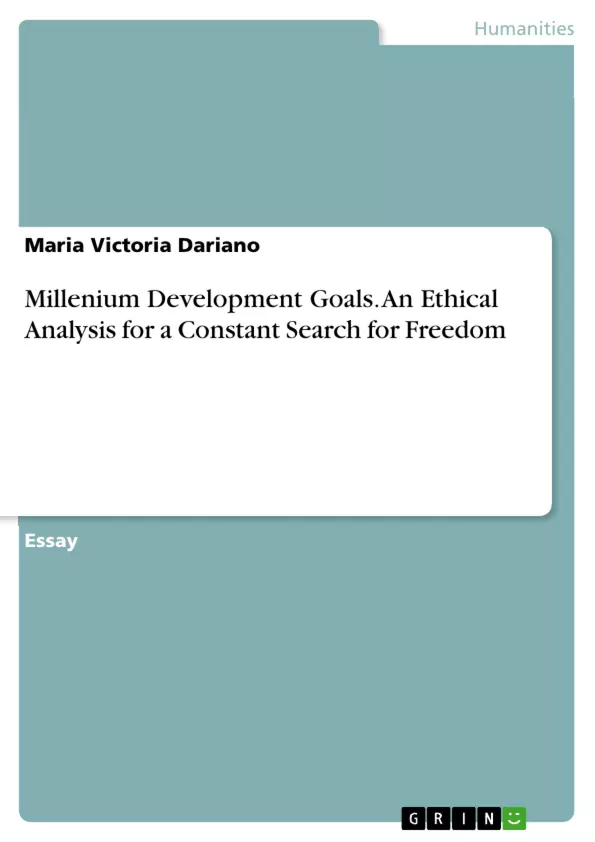“Humanity has been transformed into killing automatons.” This was briefly posited by E. F. Schumacher when he identified the current situation and perspective on human development. Human development, in all its undertakings, is measured through profit-maximization and technological advancement at the expense of culture, human-ness and environment. Many, particularly “experts” from the developed countries and from underdeveloped countries educated through western education, celebrates the alleviation of the “problem of production”.
Only through the complete exhaustion of natural resources efficiency is maximized and only through the abuse of human workforce can effectiveness be worth celebrating. However, profit maximization and technological advancement only wiped away humanity and capiturism (the greed-driven capitalism and consumerism spiraling out of control) has transformed every individual into greedy, discontented automatons; the catastrophic human desolation and destruction.
Inhaltsverzeichnis (Table of Contents)
- I. PUMP-PRIMING HUMAN DEVELOPMENT
- II. DES GASPER'S TIP-OF-THE-ICEBERG EVALUATION
- Table 1. Des Gasper's Tip-of-the-Iceberg Evaluation
- III. FREEDOM AND DEVELOPMENT: THE DUTY OF THE DUTY-BEARERS AND THE RIGHTS OF THE RIGHTS-HOLDERS
Zielsetzung und Themenschwerpunkte (Objectives and Key Themes)
This text examines the Millennium Development Goals (MDG) through an ethical lens, analyzing the goals' effectiveness in achieving freedom and development for all individuals. It explores the challenges of poverty and social inequality, arguing that a holistic approach is necessary to address these issues.
- The ethics of development and the role of human agency
- The relationship between poverty, freedom, and social justice
- The limitations of economic models and the need for a broader perspective
- The importance of cultural diversity and the recognition of human interconnectedness
- The role of education and social change in achieving a more equitable world
Zusammenfassung der Kapitel (Chapter Summaries)
I. PUMP-PRIMING HUMAN DEVELOPMENT
This chapter introduces the concept of human development, arguing that the current dominant model, focused on profit maximization and technological advancement, has led to a crisis of humanity. It explores the perspectives of E. F. Schumacher, Vandana Shiva, and Hans Küng, who advocate for a more holistic approach to development that prioritizes human well-being, cultural diversity, and environmental sustainability.
II. DES GASPER'S TIP-OF-THE-ICEBERG EVALUATION
This chapter presents Des Gasper's framework for evaluating development programs based on ethical considerations. It analyzes the MDG from three perspectives: mainstream Western economism, humanism, and radical Christianism. The chapter highlights the strengths and limitations of each perspective, emphasizing the need for a balanced approach that considers both individual and collective needs.
III. FREEDOM AND DEVELOPMENT: THE DUTY OF THE DUTY-BEARERS AND THE RIGHTS OF THE RIGHTS-HOLDERS
This chapter delves into the macro-level perspective of the MDG, emphasizing the importance of universal human rights and the need for social change. It critiques the focus on efficiency and effectiveness, arguing that a more nuanced understanding of poverty and its underlying causes is crucial for effective development interventions.
Schlüsselwörter (Keywords)
This text focuses on themes of human development, freedom, poverty, social justice, ethics, the Millennium Development Goals (MDG), human agency, cultural diversity, and the need for a holistic approach to development. Key concepts include the "crisis of freedom," "Butterfly Phenomenon," and the "tip-of-the-iceberg evaluation."
Frequently Asked Questions
What are the Millennium Development Goals (MDG)?
The MDGs are eight international development goals established following the Millennium Summit of the United Nations in 2000, aimed at reducing poverty and improving lives.
What is Des Gasper's "Tip-of-the-Iceberg" evaluation?
It is a framework for evaluating development programs based on ethical considerations, looking beyond surface-level statistics to understand deeper human and social impacts.
How does the text critique profit-maximization in development?
The author argues that measuring development solely through profit and technology ignores human well-being, culture, and environmental sustainability, transforming individuals into "automatons."
What is the relationship between freedom and development?
Drawing on ethical theories, the text suggests that true development must empower individuals and enhance their freedom, rather than just increasing economic output.
What role does human agency play in the MDGs?
Human agency is central to achieving development; it emphasizes the importance of people being active participants in their own progress rather than passive recipients of aid.
What is the "crisis of freedom" mentioned in the abstract?
It refers to the loss of humanity and individual purpose caused by uncontrolled consumerism and greed-driven capitalism (capiturism).
- Arbeit zitieren
- Maria Victoria Dariano (Autor:in), 2016, Millenium Development Goals. An Ethical Analysis for a Constant Search for Freedom, München, GRIN Verlag, https://www.grin.com/document/338292



